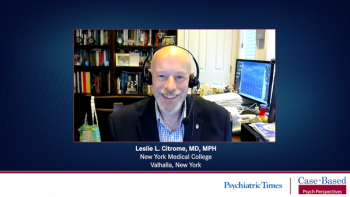
In this custom video series, experts share overall impressions of a female patient with bipolar 1 disorder who develops new onset movements suggesting tardive dyskinesia and the rationale for intervening with VMAT2 therapy.

In this custom video series, experts share overall impressions of a female patient with bipolar 1 disorder who develops new onset movements suggesting tardive dyskinesia and the rationale for intervening with VMAT2 therapy.

In this custom video series, Leslie L. Citrome, MD, MPH, and Rose Mary Xavier, PhD, MS, RN, PMHNP-BC, review the case of a male patient with schizophrenia who develops symptoms of tardive dyskinesia and comments on the appropriateness for intervening with VMAT2 inhibitor therapy.

In this custom video series, key opinion leaders discuss what to know about the use of antipsychotic therapy and screening for signs of tardive dyskinesia, and starting treatment with a VMAT2 inhibitor.

In this custom video series, Leslie L. Citrome, MD, MPH, and Rose Mary Xavier, PhD, MS, RN, PMHNP-BC, reference the Abnormal Involuntary Movement Scale (AIMS) rating scale, used to assess the severity of involuntary movements and help diagnose tardive dyskinesia.

In this custom video series, experts provide insight into strategies that may be helpful to healthcare professionals who manage patients on antipsychotic therapy to best monitor for signs of tardive dyskinesia, with special considerations regarding telepsychiatry.

In this custom video series, Leslie L. Citrome, MD, MPH, and Rose Mary Xavier, PhD, MS, RN, PMHNP-BC, caution against the use of anticholinergic medications for Parkinson’s disease and comment on the use of alternative therapies for appropriate patients.

In this custom video series, key opinion leaders compare VMAT2 inhibitors available for use to treat patients with tardive dyskinesia.

In this custom video series, recommendations regarding patient selection and use of VMAT2 inhibitors in patients with tardive dyskinesia based on current clinical guidelines and real-world practice are shared.

In this custom video series, Rose Mary Xavier, PhD, MS, RN, PMHNP-BC, shares advice that can be helpful to community providers who manage children and adult patients prescribed antipsychotic therapy about screening for involuntary body movements and early signs of tardive dyskinesia.

Clinical experiences and insights in this Case-Based Psych Perspectives were shared by Leslie L. Citrome, MD, MPH, a psychiatry specialist from Valhalla, New York, and Rose Mary Xavier, PhD, MS, RN, PMHNP-BC, a research scientist and psychiatric nurse practitioner from Chapel Hill, North Carolina. This article provides a summary of key discussion topics from this custom program.